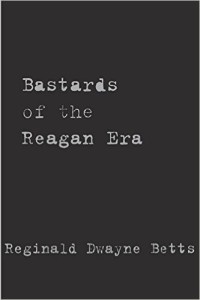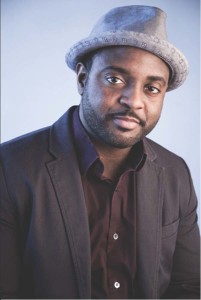 Book Title, Press, Year of Publication:
Book Title, Press, Year of Publication:
Bastards of the Reagan Era, Four Way Books, 2015.
Synopsis: Everyone has something that keeps them up at night and keeps them up during the day. Bastards of the Reagan Era is my attempt to weave all of that, the tragedy, the sadness, the love, and the grit into some poems.
What do you think makes your book (or any book) a “project book”?
I’m not sure. Maybe the binding, that declarative act. If this book is a project book, it’s because at some point all of the stories, the lyrics, they began to circle around a similar kind of ache. Maybe that’s the thing – project books seem cohesive in obvious ways, in ways that pull and disturb, that reveal and trouble.
Why this subject (or constraint)?
No adequate answer for this. The subject, the constraint, it chooses you. And I wouldn’t say constraint. I would, I do, think of it as a kind of freedom.
Are you comfortable with the term “project book”?
Not really. It’s a term that I know I’m forcing to mean something that satisfies me, but probably doesn’t mean that thing to others. It’s not as if you wake up one morning and decide to write about this – or even if you do, if you say ‘I’m going to write about this particular thing,’ that the other decisions you have to make, from line to line and poem to poem, disappear. I fear that idea, the notion of a project book, masks all the discovery that goes into it.
Was your project defined before you started writing? To what degree did it develop organically as you added poems?
Everything, I think, in my writing is organic. From line to line, from word to word. Yes, there are things I think about that push their way into my work. Ideas. Shit I want to say about prison. But this doesn’t mean the project is defined. The contours ain’t there yet. The shape is more like shadow. More like I know something is there but don’t yet know what it is. Gotta go inside the shadows and see.
Did you allow yourself to break your own rules?
In some ways. Also, in some ways I don’t really have rules. Now in this poem I do have some notions of what the work should end up looking like. There is the long poem that is patterned in many ways after Schooner Flight – but even that, I came to it through a process of work and abandonment. First that poem was in couplets, then it was free verse, then it became blank verse. It’s a struggle to discover what the poem wants to be, but it isn’t about rules as much as about process.
How important was it for you that each poem could “stand on its own” or that the poems should rely on other poems in the book, or on the premise of the project itself, to succeed? What challenges did this present for you when writing single poems or structuring the book overall?
I don’t know how to answer this. The book isn’t a book, really, until it’s a book. Before that all the poems have to stand on their own, because all the poems exist alone. And even the way they accompany each other, later, is like a series of solos that turn into some cacophony or some silence. In terms of structure, I had the ending – I knew I want to end with What We Know About Horses, and I just worked from there. I understood that the center of the book was the title poem. The arrangement became more about how poems bounced off of each other, less about the desire for things to stand alone. They stood alone before they became a book.
At any point did you feel you were including (or were tempted to include) weaker poems in service of the project’s overall needs? This is a risk, and a common critique, of many project books. How did you deal with this?
I cut strong poems. Poems I wanted there but that didn’t fit. I wouldn’t have added weak poems.
Did you fully immerse yourself in writing this project book, or did you allow yourself to work on other things?
I’ve worked on many things while writing this book. Law school, fatherhood, being a husband. Many of these poems come out of teaching, others come out of a long time ago. Out of history.
Did you ever lose momentum, bore yourself, or worry that your project could not be sustained for a full-length book? How did you push through?
It wasn’t about a full-length book, really. Not ever. There were poems and then one day there was a book.
As you were writing, were you influenced by your experience or perception of how project books are received by readers and editors (either positively or negatively)? Do you feel differently about your book being defined as a “project book” now that it has been published than you did when you were writing it?
If there is a thing called a book project, I think it’s just the accumulation of like-minded poems and the pruning of them. There are never clear directions – just pushing until the horizon ain’t that far away.
After completing a project, how did you transition into writing something new? What are you working on now? Another project?
Slowly. I just write – a poem at a time. I just write. See what happens, if anything happens.
What advice can you offer other writers, particularly emerging writers or poetry students who may be using the project book as a guiding principle for their own work?
I do think that project books are a sum of their individual parts. You can’t lose focus of that. I’d hope that people see the cohesiveness in my book as a benefit of concentrated focus – like some long haiku – instead of say a framing device. As a book that really doesn’t consciously cover a certain landscape, I hoped to do that by digging in and discovering what needed to be kept and discarded from my psyche as opposed to having a blueprint going out.


